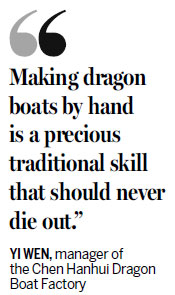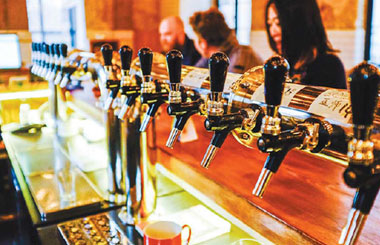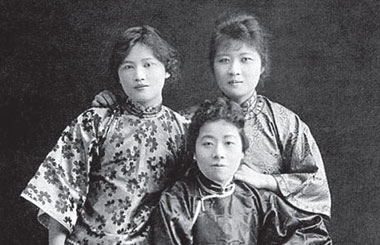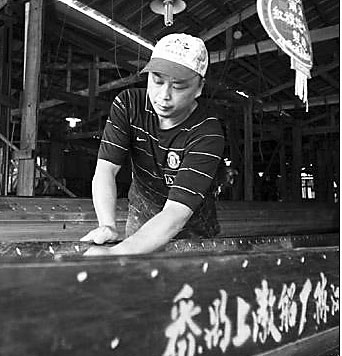Village artisans struggle to keep boat building tradition afloat
Updated: 2016-06-09 07:43
By Xu Jingxi(China Daily)
|
|||||||||
Shangjiao village was bustling with the noise of drilling and hammering in the week before the Dragon Boat Festival, or Duanwu Jie, which falls on June 9 this year as the makers of boats put the finishing touches to them ahead of the racing season.
After the work was finished, the completed traditional handmade wooden vessels were pushed onto the waterway to the sound of firecrackers that were lit for good luck.
Shangjiao village in the Panyu district of Guangzhou is one of the two major production bases for traditional dragon boats in South China's Guangdong province, the other being Zhongtang town in Dongguan.
It is a village with a history of dragon boat production dating back 140 years and, alongside the boats from the Pearl River Delta area, its products sell in the provinces of Hunan and Zhejiang, the Hong Kong and Macao special administrative regions and throughout Southeast Asia.

The superb skills of the village's dragon boat masters were selected as the city's intangible cultural heritage last year and attract admirers from thousands of miles away.
One buyer drove all the way from Zhejiang province to invite Lu Haoying, one of the master craftsmen, to Wenzhou in Zhejiang to build a dragon boat there, which ended up being more than 10 seconds faster than boats made in Zhejiang's workshops.
The most demanding part of making a dragon boat is cutting the wood for the keel and sides of the boat, Lu said.
"The cutting must be so precise and smooth that even a thread of hair cannot get into the joint. We don't use any glue to connect the pieces of wood," he said.
It takes years for a boat-builder to grasp the secrets, but few young people today want to inherit the skills their fathers and grandfathers want to pass on.
Men wearing shirts soaked in sweat or bare-chested who work in the village's shabby sawdust-covered workshops are all middle-aged. Many are even gray-haired.
"The job is exhausting and not well-paid," said Huang Shanqing, 73, who has been working at his family factory since 1980. "And there are only four months in the year when you are likely to receive orders. It is not a good job in many young people's eyes."
Huang works using skills passed down from his grandfather. But he fell ill last year after having been diagnosed two years ago with Parkinson's disease. Since then, his hands have not stopped shaking. To carry on the factory's work, he pulled his son away from his peanut oil business and pressed him into work making dragon boats.
But it seems to be a business that has left its best days in its wake. Boat production in the village reached its peak during the 1980s and 1990s, especially after Guangzhou launched its international dragon boat race in 1994. Then, the 30 or so workshops in the village produced hundreds of boats a year.
But there are fewer than 10 workshops left today, thanks to a fall in orders that boat builders attribute to the financial crisis and the limited space available for dragon boat racing because of the city's expansion into the rural areas.
Water pollution has also played a part in the decline of the sport, according to Yi Wen, manager of the Chen Hanhui Dragon Boat Factory, which is the largest in Shangjiao village.
The privately-owned factory used to produce between 30 and 50 boats a year but currently receives fewer than 20 orders during the same timeframe.
Yi, 48, began work at a State-owned dragon boat factory when he was 13 in the hope of learning skills that would stand him in good stead for the rest of his life. Today, he feels under pressure to keep his factory running and continue employing traditional boat-making skills.
"Making dragon boats by hand is a precious traditional skill that should never die out," he said. "I will hold on as long as I can, but I can't force young people to take over my job. We need financial support from the government, and we also hope they will organize more dragon boat races to engage more people so they take part in the sport and revive the tradition."
xujingxi@chinadaily.com.cn
|
A craftsman from Shangjiao village makes a dragon boat. Huang Weijun / For China Daily |
(China Daily 06/09/2016 page8)
Today's Top News
China lists first sovereign offshore RMB bond on LSE
British PM denounces Brexit's 'complete untruths'
47% of European businesses would expand in China
Xi urges Washington to boost trust
Council of Europe unveils security convention
Former PM warns of chaos in case of Brexit
Basic income plan rejected by Swiss voters
Eyeing the goal in European football
Hot Topics
Lunar probe , China growth forecasts, Emission rules get tougher, China seen through 'colored lens', International board,
Editor's Picks

|

|

|

|

|

|








